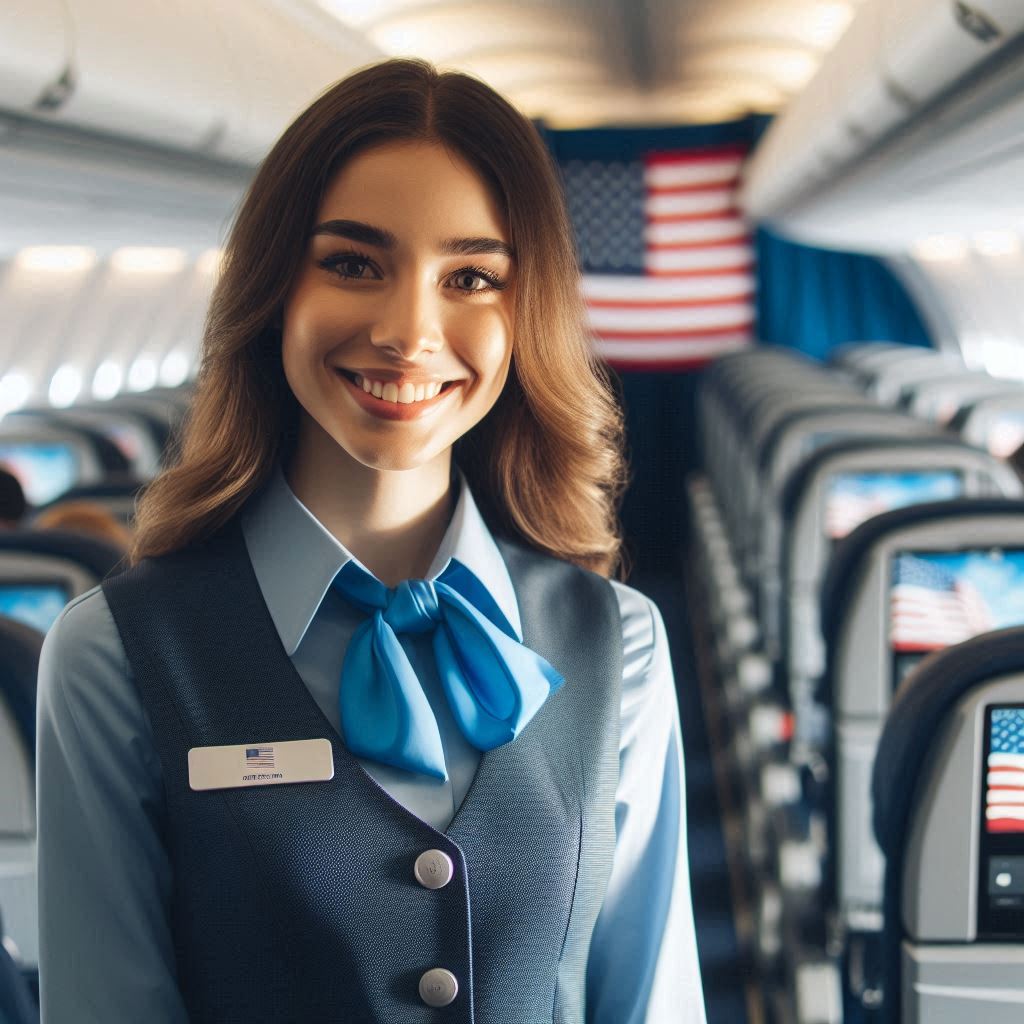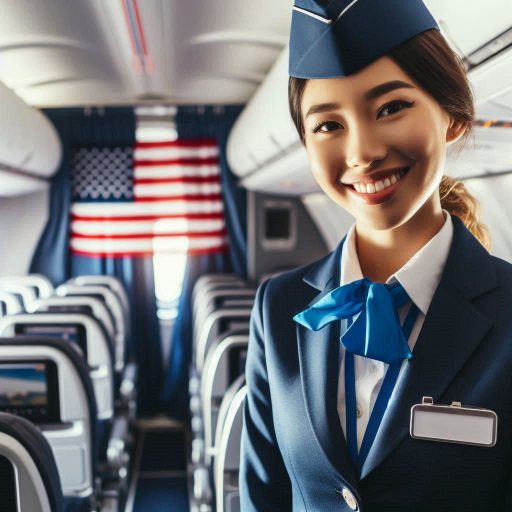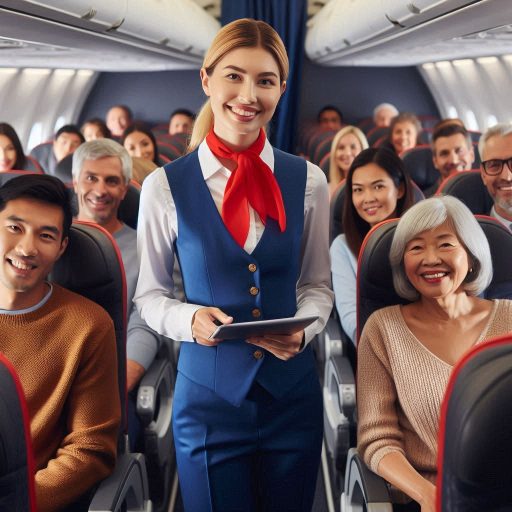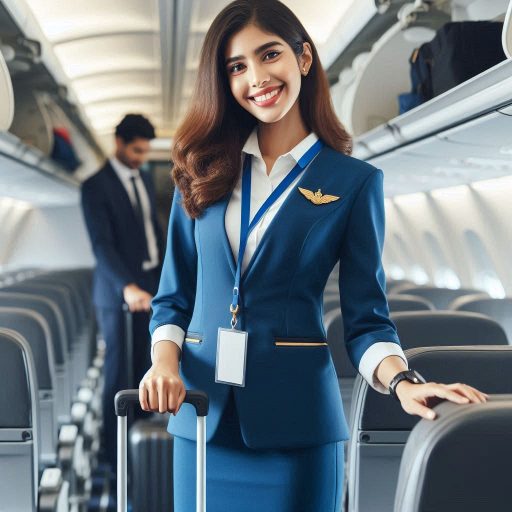Introduction
This blog post focuses on the top skills required for success as a flight attendant, highlighting the essential competencies needed to thrive in this dynamic role.
Excelling as a flight attendant demands a unique set of abilities that significantly contribute to creating a positive flying experience for passengers.
Flight attendants frequently interact with a diverse range of travelers and face various challenges during flights.
Therefore, possessing these skills is crucial for career advancement and overall job satisfaction.
Strong communication skills are vital for effectively addressing passenger needs and conveying important safety information.
Flight attendants must clearly articulate announcements and instructions while also being attentive listeners.
Additionally, problem-solving abilities are essential, helping flight attendants manage unexpected situations calmly and efficiently, whether it’s a medical emergency or a passenger complaint.
Excellent customer service skills ensure that passengers feel valued and cared for throughout their journey.
Flight attendants must remain approachable and friendly, creating a welcoming atmosphere in the cabin.
Furthermore, strong teamwork is critical, as flight attendants often work closely with pilots and other crew members to ensure smooth operations.
Excellent Communication Skills
The Importance of Effective Communication in Dealing with Passengers and Crew Members
Effective communication is crucial for flight attendants.
It helps them interact positively with passengers and crew members.
Strong communication skills foster a welcoming atmosphere during flights.
Attendants must clearly convey safety instructions and respond to passenger inquiries.
Clear communication builds trust and enhances the overall travel experience.
Flight attendants also need to communicate effectively with their team.
They coordinate with pilots and fellow crew members to ensure a smooth operation.
Good communication prevents misunderstandings and promotes teamwork.
When everyone is on the same page, it leads to better service and safety.
In summary, effective communication is a foundational skill for successful flight attendants.
It directly impacts passenger satisfaction and crew efficiency.
Tips on How Flight Attendants Can Improve Their Verbal and Non-Verbal Communication Skills
Flight attendants can enhance their communication skills through practice and awareness.
First, they should focus on clarity in their speech.
Speaking clearly and at a moderate pace helps passengers understand important information.
Next, active listening is vital.
Flight attendants must listen carefully to passenger concerns and questions.
This attentiveness shows respect and ensures that they address specific needs.
Non-verbal communication is equally important.
Body language, facial expressions, and eye contact convey messages.
Flight attendants should maintain open body language to appear approachable and friendly.
Practicing empathy also improves communication.
Understanding passengers’ feelings allows flight attendants to respond appropriately.
They should acknowledge concerns and offer reassurance when needed.
Additionally, flight attendants can benefit from role-playing scenarios.
Practicing different situations with colleagues helps build confidence and improve responses.
Seeking feedback from peers can also identify areas for improvement.
Significance of Clear and Concise Communication in Emergency Situations
Clear and concise communication is critical during emergencies.
In high-stress situations, passengers rely on flight attendants for guidance.
Quick and accurate instructions can save lives.
Flight attendants must deliver safety information promptly and without ambiguity.
During emergencies, every second counts.
Flight attendants need to communicate essential actions clearly, such as evacuation procedures.
Using simple language ensures that all passengers understand what to do.
Moreover, maintaining a calm demeanor helps instill confidence in passengers.
When flight attendants remain composed, it reassures everyone on board.
This reassurance can help prevent panic and promote orderly evacuations.
Effective communication in emergencies also includes using signals and visual aids.
Flight attendants may need to direct passengers using hand signals.
They should also point to exits and safety equipment to provide clear directions.
Therefore, communication skills are vital for flight attendants.
By focusing on effective verbal and non-verbal communication, they can enhance their interactions.
Clear and concise communication becomes even more critical during emergencies, ensuring passenger safety and confidence.
Mastering these skills is essential for flight attendants’ success in their dynamic roles.
Read: Understanding Nail Disorders: A Technician’s Guide
Customer Service Skills
The Role of Flight Attendants as Customer Service Ambassadors for the Airline
As customer service ambassadors, flight attendants ensure that passengers feel valued and cared for.
Their primary responsibility is to prioritize safety while providing excellent service.
They greet passengers with a warm smile, help them find their seats, and assist with carry-on luggage.
Throughout the flight, they remain attentive and approachable, addressing any concerns or questions.
Flight attendants also handle various situations that may arise during a flight.
Whether it’s calming a nervous passenger or addressing a complaint, their role requires quick thinking and effective communication.
By managing these interactions professionally, flight attendants enhance the airline’s reputation and customer satisfaction.
The Importance of Being Friendly, Empathetic, and Attentive to Passengers’ Needs
Being friendly, empathetic, and attentive is vital for flight attendants.
A friendly demeanor sets the tone for a positive flight experience.
When flight attendants genuinely connect with passengers, it creates a welcoming atmosphere.
Empathy allows them to understand and address passengers’ concerns, especially during stressful situations.
For example, if a passenger is anxious about flying, a flight attendant can provide reassurance and support.
Listening attentively to passengers’ needs helps flight attendants respond effectively.
Whether someone requests a special meal or needs assistance with children, being attentive demonstrates care and commitment.
Examples of How Exemplary Customer Service Can Enhance the Overall Flying Experience for Passengers
Exemplary customer service can significantly enhance the overall flying experience.
When flight attendants go above and beyond, passengers feel appreciated.
For instance, providing personalized service can make a lasting impression.
If a flight attendant remembers a passenger’s name and preferences, it fosters a sense of connection.
Another example is when flight attendants anticipate passengers’ needs.
Offering extra snacks, drinks, or comfort items can elevate the travel experience.
During long flights, checking in on passengers to ensure their comfort can make a difference.
Flight attendants can also create memorable moments.
For instance, celebrating special occasions, such as birthdays or anniversaries, can delight passengers.
Simple gestures, like a congratulatory announcement, can enhance the experience and make passengers feel special.
In review, flight attendants serve as customer service ambassadors for their airlines.
Their friendly, empathetic, and attentive approach to passenger needs is crucial.
By providing exemplary customer service, flight attendants can enhance the overall flying experience.
This commitment not only contributes to passenger satisfaction but also strengthens the airline’s reputation.
With the right skills and mindset, flight attendants can thrive in this rewarding role.
Read: How to Create a Pet-Friendly Grooming Environment
Multitasking Abilities
Need for Flight Attendants to Juggle Multiple Tasks Simultaneously During Flights
Flight attendants must juggle multiple tasks simultaneously during flights.
They manage passenger needs, ensure safety, and handle in-flight service.
This fast-paced environment requires quick thinking and adaptability.
Flight attendants may serve meals while monitoring cabin safety and addressing passenger concerns.
They must remain attentive and responsive to changing situations.
Moreover, flight attendants frequently interact with passengers.
They answer questions, provide assistance, and ensure comfort.
Balancing these responsibilities demands strong organizational skills.
The ability to multitask effectively is essential for providing a positive experience.
In busy situations, flight attendants must maintain composure while managing several duties.
Overall, multitasking skills are vital for flight attendants to succeed.
Their ability to handle various tasks simultaneously enhances passenger satisfaction and safety.
Strategies for Prioritizing Tasks and Managing Time Efficiently
To succeed, flight attendants must prioritize tasks effectively.
One strategy is to assess tasks based on urgency and importance.
For example, safety checks take precedence over in-flight service.
Ensuring that safety equipment is functional is the first priority.
Another strategy involves creating a mental checklist.
Flight attendants can mentally outline tasks before and during flights.
This helps them stay organized and focused on critical responsibilities.
Utilizing communication tools, like headsets, can also enhance efficiency.
Flight attendants can coordinate with each other seamlessly.
Time management is crucial in high-pressure situations.
Flight attendants can use techniques such as setting timers or alarms to stay on schedule.
These methods help maintain a smooth workflow throughout the flight.
By prioritizing tasks and managing time effectively, flight attendants ensure smooth operations.
Examples of Situations Where Multitasking Skills Are Crucial for Handling Emergencies or Unexpected Challenges
Multitasking skills are crucial during emergencies or unexpected challenges.
For instance, if a passenger becomes ill, flight attendants must act quickly.
They assess the situation, provide first aid, and communicate with the pilots.
Simultaneously, they may need to reassure other passengers and maintain cabin safety.
Another example involves turbulence.
When experiencing turbulence, flight attendants must ensure passenger safety.
They may need to secure loose items while helping seated passengers fasten their seatbelts.
This requires quick thinking and effective multitasking.
Additionally, dealing with unexpected service delays can present challenges.
If catering services are delayed, flight attendants must adjust their in-flight service plans.
They may need to communicate changes to passengers while maintaining a positive attitude.
In general, flight attendants must excel at multitasking to navigate the demands of their role.
By prioritizing tasks and managing time effectively, they enhance the overall flight experience.
Their ability to handle emergencies and unexpected challenges showcases their professionalism and dedication to passenger safety.
Read: Nail Technician Networking: Building Industry Connections
Conflict Resolution Skills
The Importance of Being Able to De-escalate Conflicts Between Passengers or Crew Members
Conflict can arise at any time during a flight.
As frontline representatives of the airline, flight attendants must effectively de-escalate these situations.
Their ability to manage conflicts ensures a safe and pleasant environment for everyone onboard.
When conflicts occur, tensions can escalate quickly.
Flight attendants play a crucial role in calming passengers and restoring order.
Being able to address disputes between passengers or crew members is vital.
Flight attendants need strong interpersonal skills to navigate these challenges.
They should listen actively to all parties involved and acknowledge their feelings.
Validating emotions can often defuse a tense situation.
By doing so, flight attendants demonstrate that they care about passengers’ concerns.
Conflict resolution skills are essential for maintaining a positive atmosphere.
Passengers expect a comfortable and safe experience, and conflicts disrupt that environment.
A calm and collected flight attendant can prevent disruptions and enhance overall passenger satisfaction.
Tips on How Flight Attendants Can Remain Calm and Composed in Tense Situations
Flight attendants often face high-stress situations.
To remain calm and composed, they should practice deep breathing techniques.
Taking slow, deep breaths can help manage anxiety and refocus their thoughts.
Additionally, maintaining a positive attitude is crucial.
A positive demeanor can influence the atmosphere and encourage passengers to stay calm.
Effective communication also plays a significant role in composure.
Flight attendants should speak clearly and confidently when addressing concerns.
Using a calm tone can help reassure passengers and reduce tensions.
It is essential to project confidence while addressing conflicts.
This can instill trust in passengers, making them feel secure.
Taking brief moments to step away can also help flight attendants recharge.
If a situation feels overwhelming, they can excuse themselves to regroup.
This simple technique can provide the necessary space to collect their thoughts and emotions.
Techniques for Resolving Conflicts Peacefully and Maintaining a Positive Environment Onboard
Flight attendants can utilize various techniques to resolve conflicts peacefully.
Active listening is one of the most effective methods.
By giving each party the chance to express their concerns, attendants show respect and understanding.
This approach fosters an environment where passengers feel valued.
Another useful technique is to offer solutions rather than simply identifying problems.
Flight attendants should suggest compromises or alternatives that satisfy all parties involved.
Encouraging open dialogue can also facilitate a resolution.
Attendants should encourage passengers to discuss their issues calmly, allowing for better understanding.
Empathy plays a crucial role in conflict resolution.
Flight attendants should put themselves in others’ shoes to understand their perspectives.
This understanding can lead to compassionate solutions that address underlying issues.
Ultimately, maintaining a positive environment onboard relies on effective conflict resolution.
Flight attendants who successfully de-escalate conflicts contribute to a more enjoyable flying experience for everyone.
By developing these essential skills, flight attendants can ensure their success and enhance passenger satisfaction.
Read: Developing Patience and Precision in Pet Grooming

Cultural Sensitivity
The Significance of Cultural Awareness in Providing Excellent Service
Cultural awareness is vital for flight attendants in today’s diverse travel environment.
Passengers come from various backgrounds, each with unique customs and expectations.
Understanding these differences helps flight attendants provide excellent service.
When flight attendants demonstrate cultural awareness, they foster a welcoming atmosphere.
This approach enhances the overall travel experience for passengers, making them feel valued and respected.
For instance, greeting passengers in their native language can create a positive impression.
This small gesture shows respect for their culture and establishes rapport.
Flight attendants who acknowledge cultural preferences can tailor their service accordingly.
Whether it’s accommodating dietary restrictions or recognizing traditional customs, cultural awareness is essential.
The Importance of Avoiding Cultural Stereotypes
Avoiding cultural stereotypes is crucial for effective communication and service.
Stereotypes can lead to misunderstandings and reinforce negative perceptions.
Flight attendants must approach each passenger as an individual.
By focusing on personal interactions, they can build genuine connections with passengers.
Respecting different customs and traditions is equally important.
For example, some cultures have specific greetings or dining etiquette.
Being aware of these customs helps flight attendants navigate social interactions smoothly.
This respect fosters trust and promotes positive passenger relations.
Flight attendants should continuously educate themselves about cultural differences.
Participating in training sessions or workshops on cultural sensitivity can enhance their skills.
This ongoing education equips them to handle diverse situations confidently.
Enhancing the Overall Passenger Experience Through Cultural Sensitivity
Cultural sensitivity can significantly enhance the overall passenger experience. Flight attendants who understand and respect cultural differences can prevent misunderstandings.
For instance, some passengers may have different expectations regarding personal space.
By being mindful of these preferences, flight attendants can create a more comfortable environment.
Additionally, recognizing cultural practices related to health or wellness can improve service.
Some passengers may prefer natural remedies over conventional medicine.
By acknowledging these preferences, flight attendants can better address passenger needs and concerns.
Moreover, cultural sensitivity contributes to effective conflict resolution.
If misunderstandings arise, flight attendants with cultural awareness can address issues with empathy.
This approach helps de-escalate potential conflicts and maintains a peaceful atmosphere on board.
For example, a passenger upset about a seating arrangement may have cultural reasons for their discomfort.
Understanding these reasons allows flight attendants to respond appropriately.
They can offer solutions that respect the passenger’s cultural background while ensuring compliance with airline policies.
Generally, cultural awareness is a crucial skill for flight attendants.
Understanding and respecting diverse backgrounds enhance the overall passenger experience.
By avoiding stereotypes and embracing cultural sensitivity, flight attendants can build positive relationships with passengers.
This focus on cultural awareness leads to improved service and a more enjoyable travel experience for everyone on board.
Transform Your Career Today
Unlock a personalized career strategy that drives real results. Get tailored advice and a roadmap designed just for you.
Start NowAdaptability and Flexibility
The Need for Flight Attendants to Be Adaptable to Changes in Schedule, Aircraft, or Flight Conditions
Adaptability is a crucial skill for flight attendants.
Schedules can change unexpectedly due to weather, maintenance issues, or operational needs.
Flight attendants must be ready to adjust their plans quickly.
They may have to switch to a different aircraft at a moment’s notice.
This shift can involve learning new emergency procedures or safety protocols.
Flight conditions also vary, affecting how attendants perform their duties.
Turbulence or unexpected delays can change the flight experience for everyone.
Adaptable flight attendants can effectively handle these changes while ensuring passenger safety and comfort.
Remaining calm during these situations is essential.
An adaptable attitude helps create a positive atmosphere for both passengers and crew.
Flight attendants who embrace change demonstrate resilience and professionalism.
The Importance of Being Flexible in Responding to Unexpected Challenges or Disruptions
Flexibility is vital for responding to unexpected challenges or disruptions.
Flight attendants often encounter difficult situations that require quick thinking.
A passenger may become ill, or an emergency may arise, necessitating immediate action.
In these instances, a flexible mindset allows flight attendants to assess situations quickly.
They can prioritize tasks and implement solutions effectively.
For example, assisting an unwell passenger may require collaboration with the captain and ground crew.
Flexibility also extends to dealing with diverse passenger needs.
Attendants must adapt their approach based on individual requests and behaviors.
Whether accommodating dietary restrictions or addressing concerns, flexibility is key to delivering excellent customer service.
Tips on How Flight Attendants Can Maintain a Positive Attitude and Adapt Quickly to Changing Circumstances
Maintaining a positive attitude is essential for flight attendants facing changes. Here are some tips to help you stay upbeat and adaptable.
- Practice Mindfulness: Incorporate mindfulness techniques, such as deep breathing or meditation, into your routine.
This practice can reduce stress and improve focus. - Stay Organized: Keep a planner or digital calendar to manage your schedule effectively.
Being organized helps you feel more in control. - Embrace Teamwork: Collaborate with your crew members to navigate challenges.
Supporting one another fosters a positive work environment. - Focus on Solutions: When faced with disruptions, concentrate on finding solutions rather than dwelling on problems.
A proactive approach encourages resilience. - Reflect on Experiences: After each flight, take a moment to reflect on what went well and what could improve.
This reflection fosters growth and adaptability. - Celebrate Small Wins: Acknowledge your successes, no matter how small.
Celebrating achievements boosts morale and reinforces a positive mindset.
In essence, adaptability and flexibility are crucial skills for flight attendants.
They must navigate changes in schedules, aircraft, and flight conditions with ease.
By maintaining a positive attitude and employing effective strategies, flight attendants can thrive in this dynamic environment.
Embracing these skills leads to a successful and rewarding career in the skies.
Attention to Detail
The Importance of Being Detail-Oriented as a Flight Attendant
Being detail-oriented is crucial for flight attendants in ensuring passenger safety and providing excellent service.
Flight attendants must meticulously follow safety procedures before and during each flight.
This includes conducting thorough pre-flight checks on emergency equipment and ensuring that all safety protocols are in place.
A single oversight can lead to severe consequences in aviation, making attention to detail vital.
When serving passengers, attention to detail enhances their experience.
Flight attendants should remember individual preferences, such as dietary restrictions or special requests.
This personalized service can make passengers feel valued and appreciated.
Paying attention to these details can significantly impact passenger satisfaction and loyalty.
The Significance of Following Instructions and Regulations
Flight attendants must pay close attention to instructions, regulations, and safety protocols.
Airlines adhere to strict guidelines set by aviation authorities.
These regulations ensure the safety and well-being of all passengers and crew.
Flight attendants must remain vigilant and consistently apply these standards during their duties.
Attention to detail also extends to communication with the cockpit and other crew members.
Clear and accurate reporting can prevent misunderstandings that might compromise safety.
Miscommunication can lead to errors that affect flight operations.
Therefore, being detail-oriented helps maintain an efficient and safe environment.
Moreover, flight attendants should pay attention to any changes in passenger behavior.
Observing passengers closely allows flight attendants to identify potential issues.
For example, if a passenger appears distressed or unwell, a prompt response can prevent complications.
Being alert and detail-oriented can enhance the overall safety and comfort of the flight.
Examples of How Attention to Detail Enhances Efficiency
Meticulous attention to detail can significantly enhance a flight attendant’s efficiency and professionalism.
For instance, during service, remembering specific orders or preferences allows for smoother interactions.
This reduces the time spent checking or re-confirming passenger requests.
Efficient service reflects positively on the airline and elevates the passenger experience.
Additionally, being detail-oriented aids in managing cabin organization.
Ensuring that all equipment, supplies, and personal belongings are properly stowed can create a more orderly environment.
This attention to detail contributes to a calmer atmosphere during flights, especially in emergencies.
Another example includes following emergency procedures meticulously.
Flight attendants must ensure that all safety equipment is functioning correctly and accessible.
In emergencies, their detailed training and preparation can save lives.
Practicing emergency drills and reviewing protocols regularly reinforces this importance.
Ultimately, being detail-oriented is essential for flight attendants to succeed.
It enhances safety, improves service quality, and increases operational efficiency.
By paying close attention to instructions, regulations, and passenger preferences, flight attendants create a positive flying experience.
Meticulous attention to detail not only reflects professionalism but also fosters passenger trust and satisfaction.
Teamwork Skills
The Importance of Collaboration and Cooperation Among Flight Attendants and Crew Members
Collaboration is essential for flight attendants and crew members.
Effective teamwork enhances the overall efficiency of airline operations.
Each crew member plays a vital role in ensuring passenger safety and comfort.
By working together, they can respond quickly to various situations.
Strong collaboration also helps create a positive atmosphere for both passengers and staff.
When flight attendants communicate well, they can coordinate services seamlessly.
A flight operates best when every crew member understands their role.
Each attendant must rely on others to deliver a safe travel experience.
Clear communication helps avoid misunderstandings and potential safety issues.
Flight attendants should share information regarding passenger needs, safety protocols, and any special instructions.
This sharing fosters a unified approach to passenger care and emergency procedures.
The Significance of Working Together to Ensure Passenger Safety and Comfort
The primary responsibility of flight attendants is to ensure passenger safety.
This duty requires constant vigilance and readiness to act as a team.
Collaboration enables crew members to manage cabin conditions effectively.
When passengers feel safe and comfortable, they enjoy their travel experience more.
This positive environment reflects well on the airline and encourages customer loyalty.
In emergencies, swift teamwork can save lives.
Crew members must respond quickly and efficiently to any situation.
For instance, if there is turbulence, all attendants must inform passengers promptly.
They should ensure everyone is secured and calm.
This coordinated effort reassures passengers during stressful moments.
By demonstrating unity and professionalism, crew members instill confidence in passengers.
Tips for Effective Communication and Coordination Among Flight Attendants
To enhance collaboration, flight attendants should adopt effective communication strategies.
First, establish clear lines of communication before takeoff.
Discuss roles and responsibilities to avoid confusion during the flight.
Regularly check in with each other to stay informed about passenger needs.
Second, use hand signals or discreet communication methods during service.
This approach prevents disturbances to passengers while maintaining coordination.
For instance, a simple gesture can indicate when to approach a passenger or when to assist another crew member.
This practice minimizes distractions and maintains a calm cabin environment.
Third, hold regular team meetings to discuss experiences and improve teamwork.
Sharing insights can lead to better coordination during future flights.
Encourage open dialogue about challenges faced in the air.
These discussions foster trust and build a supportive team environment.
In fact, prioritize building strong relationships with fellow crew members.
When flight attendants know and trust each other, collaboration improves.
Developing camaraderie promotes a positive work atmosphere.
Ultimately, teamwork is the foundation of flight attendant success.
By working together, crew members can create a safe and enjoyable experience for all passengers.
Conclusion
In this blog post, we will explore the top skills needed for success as a flight attendant.
As frontline representatives of the airline, flight attendants play a crucial role in ensuring passenger safety and comfort during flights.
Their skills directly impact the overall travel experience, making it essential to cultivate and refine these abilities.
Strong communication skills are fundamental for flight attendants.
They must effectively interact with passengers and crew, conveying important information clearly and concisely.
This includes safety briefings, answering questions, and addressing concerns.
Excellent problem-solving abilities are also vital.
Flight attendants face various challenges on every flight, from managing delays to handling medical emergencies.
Quick thinking and resourcefulness are essential for resolving these issues smoothly.
Additionally, teamwork is paramount in maintaining a safe and efficient cabin environment.
Flight attendants work closely with pilots and fellow crew members to ensure all operations run seamlessly.
Building strong relationships within the team fosters a collaborative atmosphere that enhances overall service quality.
Customer service skills are equally important, as they help create a positive atmosphere for travelers.
A friendly demeanor and a willingness to assist can significantly improve a passenger’s journey.
Flight attendants often serve as the face of the airline, making their interactions crucial in shaping customer perceptions.
[E-Books for Sale]
The Big Book of 500 High-Paying Jobs in America: Unlock Your Earning Potential
$19.99 • 500 High-Paying Jobs • 330 pages
Explore 500 high-paying jobs in America and learn how to boost your career, earn more, and achieve success!
See All 500 High-Paying Jobs of this E-Book
1001 Professions Without a Degree: High-Paying American Jobs You Can Start Now
$19.99 • 1001 Professions Without a Degree • 174 pages
Discover 1001 high-paying jobs without a degree! Unlock career tips, skills, and success strategies for just $19.99!




